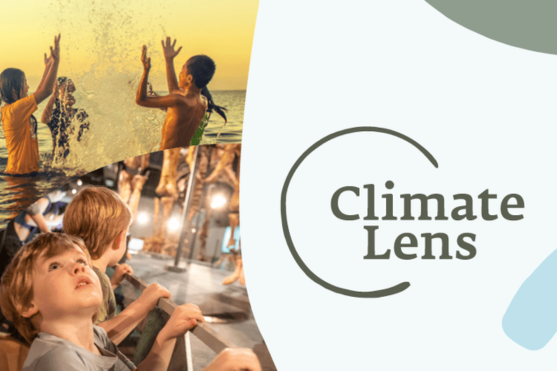One year on from the Climate Lens launch, funders tell how it’s helped

Australia’s ‘climate whiplash’ summer of dangerous downpours and scorching heat is a reminder – if one were needed – that we’re in a critical moment for action on climate change. As challenging as it may seem, there are incredible opportunities to apply a climate change lens across your funding and investments, while upholding your existing philanthropic mission.
More than 200 funders have risen to the challenge with the help of Australia’s first-ever Climate Lens tool developed by the Australian Environmental Grantmakers Network (AEGN) in partnership with Philanthropy Australia.
Launched last March, the tool has been designed to help all Australian funders better understand –and armed with this insight mitigate against – the cross-cutting impacts of climate change.
It’s a complex issue, and there is no one “right” way to tackle it, so over the past year the AEGN has been supporting funders to develop their own bespoke responses through a series of climate lens workshops, masterclasses and a dedicated community of practice. The latter comprised five online sessions during the second half of 2023 in which funders shared experiences and learned how to turn the theory of caring about climate change into practice for their organisation. Sessions will run again in 2024.
Grantmaking with a climate lens
Sarah Matthee, Climate Solutions Portfolio Lead at the Foundation for Rural & Regional Renewal (FRRR), was among last year’s community of practice cohort.
“The tool has been such a helpful crosscheck as we developed the theory of change for our new climate solutions grant program,” says Sarah. “It prompted us to think of things we might not have otherwise included and consider language we might not otherwise have used. The AEGN’s work is informed by experts in the field – it was great to leverage that knowledge.”
Launched last year, FRRR’s Community Led Climate Solutions program supports remote, regional and rural communities as they embark on initiatives to mitigate and adapt as the climate shifts around them. The first 16 grantees were announced earlier this month. FRRR is sharing the learnings from this first round at an event co-hosted by AEGN in Melbourne on 17 April.
“Across FRRR’s work more broadly, we’re looking to embed a few lenses, including in response to vulnerability to climate change and natural disasters, but also around responding to communities in transition. So, if a grant application comes into any program and there’s a disaster or climate risk attached to it, or it’s about transition – including the energy transition – then it will be caught through those lenses and given additional consideration,” says Sarah.
Learning with other funders
Briar Stevens, Environment Program Manager at Equity Trustees, has been following FRRR’s progress after participating in the community of practice together.
For Briar, learning how to address the issue of climate change with other funders has offered a sense of solidarity, but also an appreciation for the fact that no two funders are the same. “Our conversations threw up ideas and themes, especially around seeking to fund in those areas of intersection – that was one of the biggest things that came out of it for me. It gave me the confidence to go back to my team and say we’ve got the tool kit – now we need to start doing it!”
Over the past year, Briar has worked with the social impact team at Equity Trustees to develop and apply lenses across their granting practice, arriving at the lenses of First Nations, women and girls, and climate change.
“We’re basing this work on evidence-based mutual learning, working closely with thought leaders and peak bodies who are ahead of us in this work,” says Briar. “It’s that ongoing research, trust and collaboration, working with sector partners, including the AEGN, which is helping us to understand the unique challenges and the specific priority needs of applying these lenses.”
“We really are in the beginning stages of this journey, and as a business we’re learning how to do this authentically and effectively.”
‘A great day for climate’
One of the largest providers of philanthropic services in Australia, Equity Trustees grants across a wide range of focus areas, challenging Briar and her team to determine how to apply their chosen lenses across a diverse portfolio.
“Just by starting on this journey as program managers, it’s giving us that frame in the context of the conversations we’re having each day, and then practically, we’re starting to embed questions within our grant applications and our reporting. It’s a learning process and we’re going to have to test it with our grant partners. We need to learn and be guided as we go.”
Recent grants were awarded within Equity Trustees’ “equity and empowerment” focus area to Regen Melbourne and Women’s Environmental Leadership Australia (WELA) — the first two to be assessed with a climate lens in place.
“When you look at the example of WELA, it’s fantastic because you’re at the intersection of women and climate and leadership. Where we’re able to come across opportunities like that, we’re all really excited,” says Briar.
“When those two grantees were funded, I wrote a note [to my colleague] saying this is such a great day for climate. It’s actually happening – we’re doing it!”
Visit the AEGN’s website to find out more on upcoming related events and download the Climate Lens tool.
The Climate Lens tool has been made possible through the generous support of The Robert Hicks Foundation, managed by Equity Trustees, which provided seed funding to develop the lens, and the Lord Mayor’s Charitable Foundation through its support for the AEGN’s climate change program.